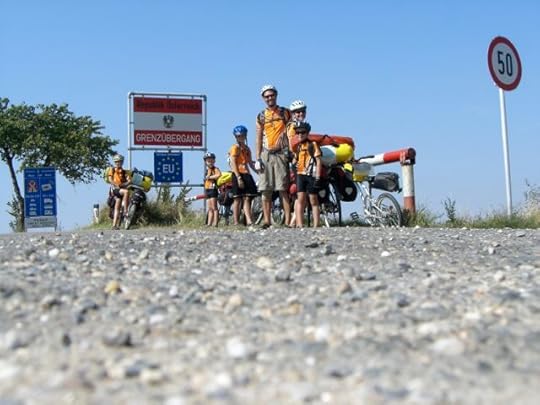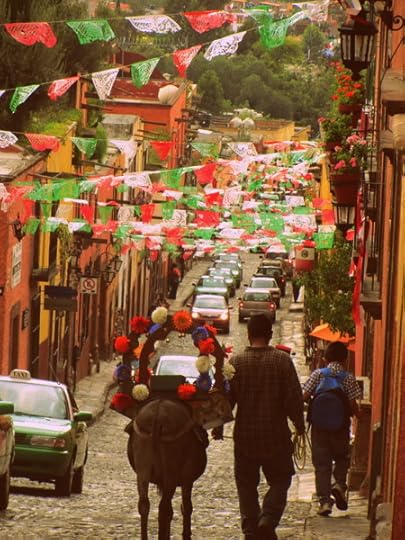Rolf Potts's Blog, page 54
October 8, 2013
Why we travel: Invest in memories, not stuff
Vagablogging :: Rolf Potts Vagabonding Blog
“Wow, it must be nice to be able to afford to travel so much…”
I understand why people say that. I get that the question behind it stems from the number crunching going on that includes a mortgage payment, car payment, clothing, food, insurance, and luxury items that pad their existence. I know they’re thinking about how that week long trip to Disney with their kids cost them in the neighbourhood of $5000 last year and they’re doing the math on how that could possibly be sustainable, times four weeks to a month, times 12 months to a year, times six years.
Of course that math is faulty. There’s a big difference between lifestyle travel and vacation. But there’s something else:
Long term travel is about a priority shift more than it is budgeting.
Long ago we realized that we could afford a “normal life” with a house, two cars, music lessons for the kids and the usual trappings. Or, we could afford to travel slowly for as long as we liked, but we could not afford to do both. Either in time, or money. Of the two, time is the more precious currency to us.
And so, we chose to travel.
Which means that we chose to give up the lovely three bedroom house, with an office and purpose built school room on 2 acres, surrounded by state forest. We sold most of our “things.” We sold our cars. I traded my lovely down comforter for a sleeping bag, my kitchen with all the appliances for two gas burners in Thailand, my fancy wash-and-dry-in-one-go machine for a bucket or a river.
We’ve chosen to invest both currencies: time and money in collecting memories and dreams instead of knickknacks and a closet full of shoes. That’s why we started traveling and that’s what keeps us traveling. We’ve traded comfort for a long string of, “Remember when….”
My Dad is famous for saying that life is like a coin, you can spend it any way you want, but you can only spend it once. We’re spending it on collecting memories and relationships, not tangible things. Does that make us minimalists? Absolutely not! We’re maximalists to the max! We’re just filling up the inside instead!
Original article can be found here: Why we travel: Invest in memories, not stuff
October 6, 2013
These days, even journeys to remote places can be fact-checked
Vagablogging :: Rolf Potts Vagabonding Blog
“Traveling in Siberia a decade ago, I thought I was pretty much beyond the reach of checkability; in fact-checker shorthand, anything I wrote would be “O.A.,” which stands for “on author,” meaning “unverifiable by anything other than the author’s say-so.” I did not need to worry that any checker would visit where I had been, nor was it likely that an irate reader would write in claiming I had got something wrong about the tundra zone of the Chukchi Peninsula, given the difficulty of getting there and the absence of any reason to go. But then time and advancing technology proved me wrong. During the many years my Siberian research took, satellite imagery of the earth’s surface became available online, and my claims about the lay of the land in Siberia proved to be checkable after all. Even in far-flung places, descriptions could be verified. If I said there was no bridge over a remote Far Eastern river that I had crossed by ferry, the checker could look on Google Earth and see that, in fact, no bridge showed up in the satellite photo, and a small boat much like a ferry could be seen crossing there.”
Ian Frazier, “The Tale-Telling Days Are Over,” Outside, November 2012
Original article can be found here: These days, even journeys to remote places can be fact-checked
October 1, 2013
Vagabonding Field Report: Celebrating life in San Miguel de Allende, Mexico
Vagablogging :: Rolf Potts Vagabonding Blog
Cost/day: $40
What’s the strangest thing you’ve seen lately?
All of the donkeys or burros that are on the streets. I am not used to that. It’s a bit of old world Mexico, and I love it.
Describe a typical day:
San Miguel de Allende seems to think that everyone should rise at 6:30. That’s when the church bells start ringing, and the birds start singing. That’s when I get up. I make coffee and fresh juice in my outdoor kitchen while watching the hummingbirds flit around having their breakfast. I write in the mornings. Then, I go to Spanish class. In the afternoons, I always say I will take a siesta, but I usually wind up wandering the colorful streets and taking it all in. Sometimes, I go sit in the Jardin, the town’s main plaza, and watch the interesting people who gather there.
Describe an interesting conversation you had with a local:
I am still learning Spanish, so I haven’t gotten very far in conversation. I have the same conversation with all of the locals. “How are you? I’m fine. What’s your name?” I can’t wait to learn more, and have longer conversations. But this man always sits out on the narrow sidewalk with a Coca-Cola. I pass by him everyday on my way to Spanish class, and we smile at each other, and he just warms my heart. I think he is lonely, so I try to do something for him everyday. I think his favorite day was when I sprayed him with my patchouli-lavender spray. His wide toothless grin was enough to make me feel that I had fulfilled my purpose that day.

What do you like about where you are? Dislike?
I love the way that I seem to enjoy each day on a deeper level here. Time seems to pass really fast, but at the same time I don’t feel stressed or in a hurry. I love the vibrant colors and the way everyone here seems to celebrate life. I got here just in time for La Alborada, San Miguel de Allende’s biggest festival where they honor Saint Michael. I love how the Mexican people celebrate their heritage and carry on traditions.

Describe a challenge you faced:
When I first got here, I had a bit of a culture shock when I realized that there wasn’t as much English spoken as there are in the more touristy areas of Mexico. I had a bit of trouble communicating. But, this forced me to start learning more Spanish as soon as possible, and I’m enjoying learning their beautiful language.
What new lesson did you learn?
Not to be afraid to speak as much Spanish as I know. That the local people will help me learn, and I don’t need to be afraid to say something wrong. That you can use more than words to communicate with people.
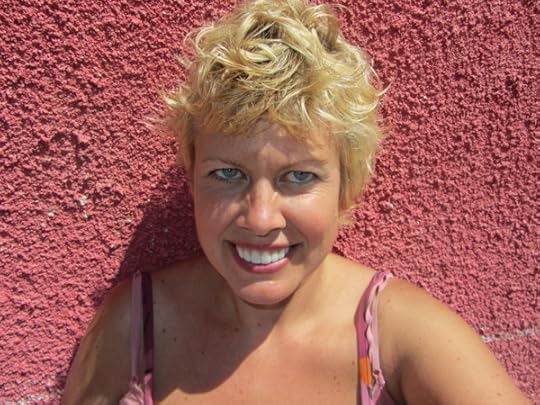
Where next?
I’ll be here until March, and then I’m off to Europe! I like slow travel.
For more about my travels and great advice on beaches and islands, check out my website This Way To Paradise and my Facebook page!
Original article can be found here: Vagabonding Field Report: Celebrating life in San Miguel de Allende, Mexico
“I don’t want comfort…” On travel and Aldous Huxley
Vagablogging :: Rolf Potts Vagabonding Blog
“But I don’t want comfort. I want God, I want poetry, I want real danger, I want freedom, I want goodness. I want sin.” – Aldous Huxley, Brave New World
This quote stopped me in my tracks this week. I’m a lover of Huxley’s works and of course Brave New World is a classic. I’m a gypsy at heart and I was born to gypsy parents. When I get too comfortable, I get listless, I get bored, my mind wanders and so does my heart, even when my body cannot. I have a soul that “wants,” in so many capacities.
This is why I travel: because “god” is in the faces of the people I meet in rice paddies on islands in the middle of the Mekong. Because poetry is in a lightning storm over my favourite volcano, and in the drums beating in an African midnight and in the sun rising behind the ruins of Angkor Wat. The danger makes me feel alive. The freedom fuels my creativity, my passions, my very juices. I’m one of those people who wants to believe in the goodness of the world, and travel reassures me of that every single day. Being taken in by a stranger, fed from the bowl of a smiling little child, sheltered from the rain by a laughing toothless woman, invited to work, ankle deep in the mud, alongside women who can communicate with me only with smiles and eyes. As to the sin, my feet are never far from that, I’m afraid… but then again what the road teaches you is that sin is relative, and is a teacher more than anything. Somewhere in the deep dark I learned to let go of everything but the lesson and step into the light.
Original article can be found here: “I don’t want comfort…” On travel and Aldous Huxley
September 29, 2013
Matt Gross on the art of getting lost
Vagablogging :: Rolf Potts Vagabonding Blog
“The first thing you do when you arrive in a strange city and want to get lost is put your bags away. Getting lost involves — requires — intense wandering, and a suitcase or heavy backpack is only going to slow you down and make you long for a hotel, a shower, and a change of clothes. If you’re lucky, you’re already at the bus or train station, and the left-luggage office is perfectly equipped to care for your things as long as you like. And then, swearing never to glance at the map on your phone, you just set out.”
–Matt Gross, The Turk Who Loved Apples: And Other Tales of Losing My Way Around the World (2013)
(2013)
Original article can be found here: Matt Gross on the art of getting lost
September 27, 2013
“Germany’s second-largest airline has become a mesmerizing spectacle of shaming and apology.”
Vagablogging :: Rolf Potts Vagabonding Blog
We’ve all heard horror stories from our friends—and have many of our own—about certain airline experiences. With the sheer volume of flights scheduled around the world on any given day, it is a statistical certainty that there will be the occasion snafu, and sometimes it’s your flight’s turn to have the bad day, and sometimes it isn’t. So, it’s generally wise to not let one friend’s horror story or isolated incident inform your opinion of an airline.
That’s what I thought when I head of a friend’s troubles with Air Berlin the other day. Living in Copenhagen, she was scheduled to fly to Miami for a short vacation to see family. Due to an epic screw-up on the airline’s part, she has found that the soonest she could reach her destination would be in two days, thus destroying her much-anticipated visit. This was compounded by the fact that they were reportedly rude and unhelpful.
She was crushed and angry, so I took her rant about the airline with a grain of salt, especially considering the sterling reputation of the normally efficient Germans. She was crushed and angry, so I took her rant about the airline with a grain of salt—until I read this.
In fairness, other friends who have flown the airline reported nothing but positive experiences. But when a major magazine runs a story about an airline’s slow-motion meltdown and includes the line, “Germany’s second-largest airline has become a mesmerizing spectacle of shaming and apology” in the first paragraph, there is definitely grounds for warning my fellow travelers to think twice before booking until the company sorts itself out.
Original article can be found here: “Germany’s second-largest airline has become a mesmerizing spectacle of shaming and apology.”
September 24, 2013
Traveling: Dangerous business
Vagablogging :: Rolf Potts Vagabonding Blog
I sat on the porch in the Australian late afternoon sun, shadows stretching long across the grass, cockatoos screaming through the bush canopy, sipping my tea, knitting. My mind wandered as the guys discussed the merits of following our instinct and road tripping right straight up through the red heart of Australia instead of the well traveled coastal route. There was a lull in the conversation.
“My Dad make that walking stick?” I changed the subject, pointing to a stick, with a sad face carved into the hand grip, sticking out of an oriental pot next to the front door of the mud brick house.
Robert nodded. He’s a man of few words.
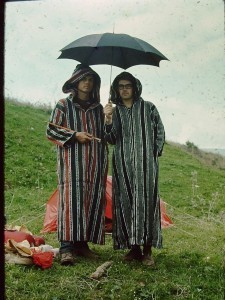 I smiled. My mother’s stained glass hangs in their big round window. There’s a photograph of my Dad and Robert hanging by the front door. In it they are young men wearing jalabas, standing under an umbrella with posed, stone faces, in front of a violent orange tent somewhere in North Africa.
I smiled. My mother’s stained glass hangs in their big round window. There’s a photograph of my Dad and Robert hanging by the front door. In it they are young men wearing jalabas, standing under an umbrella with posed, stone faces, in front of a violent orange tent somewhere in North Africa.
“You see that number plate on the wall,” Jesse pointed out, the first morning at breakfast, “That’s off the bug we were driving in Africa when we picked up your parents.”
And so, I find myself as far away from my Canadian home as I could possibly be, and yet surrounded by my family. That’s a special kind of traveler’s magic. At every turn this weekend I’ve been reminded how the smallest act of kindness, the impulse of a moment can change the history of the world, or the path of a family, for generations.
Robert and Jesse picked up my parents, hitchhiking, in North Africa forty-some years ago. The rest, as they say, is a well-storied history. Last night Robert played his guitar and sang in his lilting Australian voice along with a fiddle played by the granddaughter of his long-time adventuring buddy.
I guess they’re right; the folks who say picking up hitchhikers is so dangerous. If you’re not careful, you might just change your world, the path of your life, the people you call friends and chosen family. You might end up weaving generations together on opposite sides of the planet in ways that enrich the lives of a stranger’s grandchildren. Dangerous business, this.
Original article can be found here: Traveling: Dangerous business
September 22, 2013
The hardship of travel is what makes it rewarding
Vagablogging :: Rolf Potts Vagabonding Blog
“Day after day, perhaps week after week and month after month, your foot is in the stirrup. To taste the cold breath of the earliest morn, and to lead, or follow, your bright cavalcade till sunset through forests and mountain passes, through valleys and desolate plains, all this becomes your mode of life, and you ride, eat, drink, and curse the mosquitoes as systematically as your friends in England eat, drink, and sleep. If you are wise, you will not look upon the long period of time thus occupied in actual movement as the mere gulf dividing you from the end of your journey, but rather as one of those rare and plastic seasons of your life from which, perhaps, in after times you may love to date the moulding of your character — that is, your very identity. Once feel this, and you will soon grow happy and contented in your saddle-home.”
–Alexander Kinglake, Eothen: Traces of Travel Brought Home from the East (1834)
(1834)
Original article can be found here: The hardship of travel is what makes it rewarding
September 19, 2013
Vagabonding Field Report: Awakening to the peaceful pace of life at Hariharalaya Retreat Centre, Roluos Village, Cambodia
Vagablogging :: Rolf Potts Vagabonding Blog
Cost/day: $20
What’s the strangest thing you’ve seen lately?
This. In my pants. ‘Nuff said.
Describe a typical day:
I rise at 6 a.m. and do 90 minutes of yoga, 30 minutes of chanting, and one hour of meditation. Three hours after sunrise and plenty of activity later, I’m more than awake and ready for breakfast.

After breakfast, I wash in the outdoor showers and read a book in one of the many hammocks around the property.

Karma yoga, a kind of community service/volunteerism, happens three days a week. We clean the yoga hut and weed the garden.
Dharma talks happen at noon every day and could be about anything. One was a meditation Q&A; another was a snail’s-pace walking meditation.
In the afternoon, I practice slacklining, write in my journal, or paint in the creativity hut. I led an impromptu yoga session one afternoon when a bunch of us were lazing around on our mats.

The list of extra activities is wonderfully full. Shiatsu massage by a blind Khmer man. Workshops on body language, digestion and tantra. Reiki. Day trips to Angkor Wat and a hidden temple. Cruises around the village on old, rusty bicycles.

There is usually a guided meditation (yoga nidra, anyone?), a short poetry reading, and one collective “om” before we sit down to eat our vegan dinner.

Conversations persist long after the meal, unhindered by phones and computers. Technology seems far away and unimportant out here.
Describe an interesting conversation you had with a local:
This is Marina, a 24-year-old Khmer woman who sells clothes and bags in Roluos. Her parents died a few years ago, so she lives with her aunt. Her spoken English is nearly flawless, but she wants to learn how to write. Books, paper and pencils are hard to get in the area. We talked for almost half an hour about anything from her business to life in America.
 What do you like about where you are? Dislike?
What do you like about where you are? Dislike?I love seeing a sky bursting with stars. I love walking barefoot around the retreat. I love developing my own personal practice with yoga and meditation that I can apply at home.
My body has adjusted to a rhythm in step with sunrise and sunset. It feels restful. Natural.

I don’t like the relentless heat and humidity of Cambodia. No sooner have I showered than I’m sweaty again.
I also think I need more protein than the retreat’s vegan meals provide. I get hungry two hours after I’ve eaten a meal.
Describe a challenge you faced:
I did three consecutive days of silence. The first day, Saturday, was a mandatory silence day for the whole retreat. I welcomed the quiet environment as a time to reflect, read and write.
Sunday and Monday, however, were harder.
Most of the group had gone back to talking, and there were times when I would forget and let a word slip (“Sorry!”). Even worse, by Monday, I really wanted to talk to someone about what I was thinking and feeling–and I couldn’t.
What new lesson did you learn?
From those three days of silence, I learned how to become a better listener. I realized that I often interject conversations with semi-relevant or totally irrelevant information. Instead of talking to hear myself talk, I use much more eye contact and undivided attention on the person speaking to me now.
 Where next?
Where next?After a year abroad, I’m finally going home to Colorado. I’ll be going on a road trip to a permaculture festival in Arizona shortly after my return.
Original article can be found here: Vagabonding Field Report: Awakening to the peaceful pace of life at Hariharalaya Retreat Centre, Roluos Village, Cambodia
September 18, 2013
Vagabonding Field Report: Fiji
Vagablogging :: Rolf Potts Vagabonding Blog
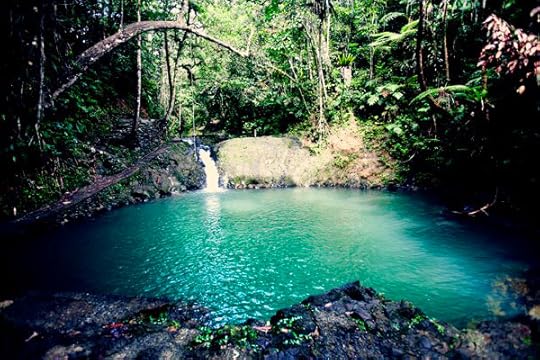
Cost/day: $30
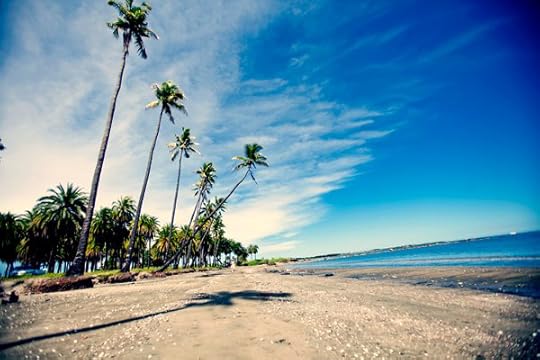
What’s the strangest thing you’ve seen lately?
I guess I could say that the wild plants and animals are “strange,” but a better word might be interesting, or beautiful. A friend showed us some plants that recoil if you touch them (“sensitive plants”), and from what it looks like you could drop a seed just about anywhere in Fiji and it will grow and thrive. Just about everything you could need grows there, even a plant that you can squeeze and get “shampoo” out of.

Describe a typical day:
We moved around a lot in Fiji. Buses, ferries, some light hiking. Some afternoons involved a hammock and a book. We drank Kava with the locals, swam in lagoons, took photos of the beautiful flora and fauna, and tried to fight nausea on the buses around the island.


Describe an interesting conversation you had with a local:
Just about everyone in Fiji was friendly. People would come up to us and ask where we were from and what we were doing there, and insisted that if we came back we could stay with them. On our first day we met Junior and some of his friends, who invited us to hang out and gave us fresh coconut milk, fish we watched him clean and cook, and they taught us the Kava song. Junior told us that he loved living simply and meeting people from around the world, and that one day wants to be involved in the Workaway program so that people can stay with him and learn about Fijian life.



What do you like about where you are? Dislike?
I love the laid back pace of Fiji. To say that people are friendly would be an understatement. People smile and say “bula!” when they pass each other. I like that the food is fresh and tropical. I love the lack of stress and worries. I disliked getting motion-sick on the long bus rides.


Describe a challenge you faced:
My friend and I that were traveling didn’t plan much out, but one night we knew we were staying at Bobo’s Farm on Ovalau. We had to figure out the bus and ferry schedule, which were a little lax at times. Then once we got to Ovalau, we had no idea how we would find Bobo or his farm. When our bus and ferry landed at Ovalau, it appeared that some people would stay on the bus and keep going into the city, and some would get off then. We had no idea what we should do, so we tried to ask a worker if he knew where Bobo’s Farm was. He shrugged and unloaded our bags. Then he suddenly had a flash of recognition, and said “oh, Bobo there,” and there was Bobo, waiting in his truck to pick us up down the road. No idea how he even knew we would be on that ferry, and at the time we thought it was hilarious!
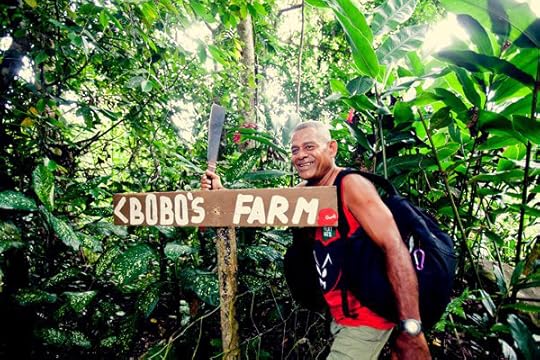
What new lesson did you learn?
This was the very first stop on our round the world trip, so the big lesson we learned from Fiji was that selling everything and traveling for a year was the best decision we’d ever made!
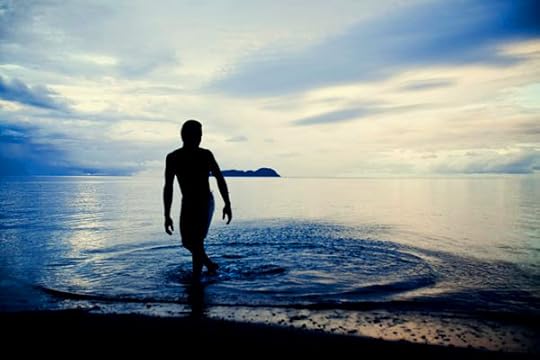

Where next?
Next I’m headed back to Europe for a few months, but after posting this I kind of want to be in Fiji again…more travels here!

Original article can be found here: Vagabonding Field Report: Fiji
Rolf Potts's Blog
- Rolf Potts's profile
- 323 followers


